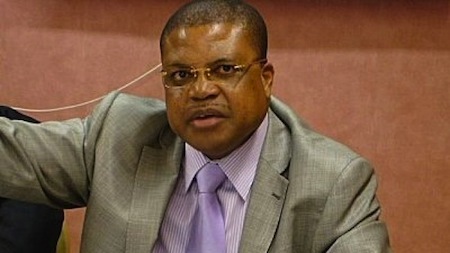Though the January centrafricaine ceasefire between the administration of François Bozizé and Séléka coalition rebels didn’t last much over two months, its elevation of Nicolas Tiangaye to government may yet provide a solution for governing Central African Republic in a diplomatic impasse that’s become a tricky international issue for African countries from Chad to South Africa. ![]()
Séléka coalition rebels took control of the capital, Bangui, on March 24, forcing Bozizé into exile, and proclaiming Michel Djotodia as the country’s new interim president. But the new government just as quickly reappointed Nicolas Tiangaye as the country’s prime minister. Tiangaye (pictured above), a well-respected constitutional attorney and human rights activist whose role in centrafricaine politics goes back to the 1980s and before, became prime minister pursuant to the January ceasefire agreement.
Where Tiangaye was once the figure that the rebels looked to as ‘their man’ in Bozizé’s government, Tiangaye has now become the man who pro-Bozizé forces now look to as ‘their man’ in the rebel-led government — indeed, both sides continue to praise Tiangaye, who founded the Central African Human Rights League in the 1990s:
“A man of integrity in a sea of corruption,” says one diplomat. “He has integrity. His record is impeccable. He doesn’t compromise,” adds top opposition figure Martin Ziguele. “A good person,” says Eric Massi, spokesman for the Seleka rebels. “We respect him,” adds a member of government.
To the extent that the international community can force a political settlement, all paths go through Tiangaye.
That hasn’t been enough to win the international stamp of approval — Chadian president Idriss Derby, speaking on behalf of the Economic Community of Central African States today, has refused to recognize the self-appointed Djotodia government, and other countries, including the United States, those from the African Union and those from the European Union, have been hesitant to recognize Djotodia, a former civil servant in the administration of Ange-Félix Patassé (Bozizé’s predecessor) and leader of the Union of Democratic Forces for Unity (UFDR), only gained power of the broad Séléka rebel group in recent years.
As it stands now, the CAR has been suspended from the African Union, which also froze the Séléka rebels’ assets and imposed a travel ban on Séléka leaders.
That’s in part because Djotodia, days after taking power, dissolved the country’s parliament and suspended the country’s constitution for a three-year period, claiming that he would hold power through 2016, when new elections would be called — a timeline that much of the international community thinks is too slow. Djotodia was appointed in February 2013 as a deputy prime minister for national defense under the auspices of the ill-fated ceasefire agreement.
It’s also because, in taking power, rebels killed 13 South Africans troops, out of a contingent of around 200 that came to Bangui ostensibly to protect South African mining, oil and other contracts.
Regardless of why South African forces were in the CAR and fought so hard to defend Bozizé, the South African position has made reaching some sort of international recognition even trickier.
Tiangaye has so far defended the rebel-led government, noting that Bozizé failed to live up to the terms of the ceasefire:
“I don’t think one could call it a coup d’état,” said Mr. Tiangaye, who is the country’s leading human rights lawyer. “There was an armed confrontation, the president fled, and there was an institutional void. So, the military victor filled the void. Bozizé refused the accords that precipitated the end of his regime. He alone is responsible.”
Bozizé, meanwhile, fled initially to Cameroon, and has requested asylum in the west African nation of Benin, where he lived in exile in the 1980s. For his part, Bozizé this week was accusing Chadian forces of ousting him from office, though allegedly, Chadian forces only recently helped boost the Bozizé regime.
In contrast to, say, Mali, where the potential rebel takeover of Bamako would have marked a rupture in a country that had over a decade of experience with democratic and peaceful rule, there’s a lot of continuity in the Séléka-led takeover within the context of violence power transitions in the Central African Republic — Bozizé himself came to power in a 2003 coup against Patassé.
The country, one of the world’s poorest, has little experience with transfers of power other than coups or rebel takeovers since its independence from France in 1960 — Jean-Bédel Bokassa is perhaps the most infamous of the country’s military leaders, ruling from the mid-1960s and in the 1970s, his last three years as ’emperor of Central Africa.’ Tiangaye made his mark as one of the country’s leading attorneys when he served as defense counsel to Bokassa in the 1980s after Bokassa himself was overthrown as ’emperor,’ and in 1989, he even once served as defense counsel to Bozizé on corruption charges.
Tiangaye served as one of the authors to the current CAR constitution, though he quickly turned against Bozizé when it became clear that Bozizé had no intentions with breaking from the business-as-usual model of autocratic centrafricaine governance, and Tiangaye unsuccessfully ran for the CAR’s parliament in 2005 and 2011 (in the latter case, directly against Bozizé) in elections that he credibly claims were rigged.
As the senior statesman at the helm of the Djotodia government, however, Tiangaye now has the biggest opportunity — and challenge — of his career in helping to craft a long-term solution for the Central African Republic that puts the country on a more peaceful and stable path than the one it’s followed in the past half-century and that does so with the support of the rest of the African community.

One thought on “Longtime centrafricaine attorney Tiangaye key to peaceful CAR resolution”